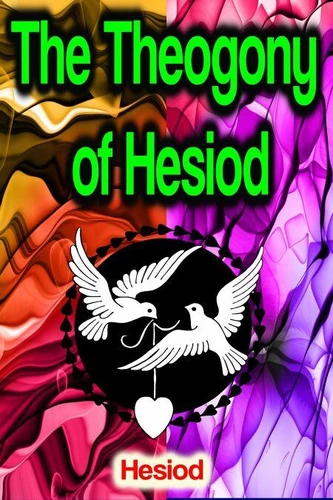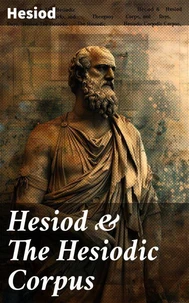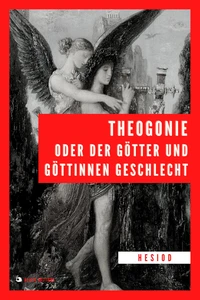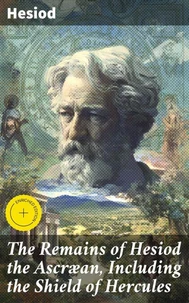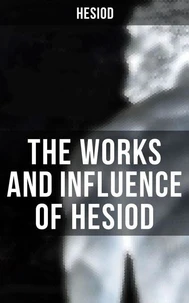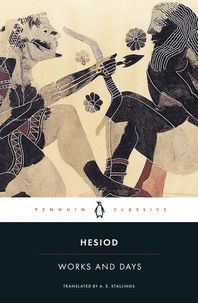The Theogony of Hesiod
Par :Formats :
Disponible dans votre compte client Decitre ou Furet du Nord dès validation de votre commande. Le format ePub est :
- Compatible avec une lecture sur My Vivlio (smartphone, tablette, ordinateur)
- Compatible avec une lecture sur liseuses Vivlio
- Pour les liseuses autres que Vivlio, vous devez utiliser le logiciel Adobe Digital Edition. Non compatible avec la lecture sur les liseuses Kindle, Remarkable et Sony
 , qui est-ce ?
, qui est-ce ?Notre partenaire de plateforme de lecture numérique où vous retrouverez l'ensemble de vos ebooks gratuitement
Pour en savoir plus sur nos ebooks, consultez notre aide en ligne ici
- Nombre de pages222
- FormatePub
- ISBN978-3-98647-353-2
- EAN9783986473532
- Date de parution24/12/2021
- Protection num.Digital Watermarking
- Taille624 Ko
- Infos supplémentairesepub
- ÉditeurMario Huehne
Résumé
The Theogony of Hesiod Hesiod - The Theogony is essentially a large-scale synthesis of a vast variety of local Greek traditions concerning the gods and the universe, organized as a narrative that tells about the creation of the world out of Chaos and about the gods that shaped the cosmos. To some extent, it represents the Greek mythology equivalent of the book of Genesis in the Hebrew and Christian "Bible", as it lists the early generations and genealogy of the gods, titans and heroes since the beginning of the universe.
Interestingly, Hesiod claims in the work that he (a poet, and not some mighty king) had been given the authority and responsibility of disseminating these stories by the Muses directly, thus putting himself almost in the position of a prophet. In formal terms, the poem is presented as a hymn in 1, 022 lines invoking Zeus and the Muses, in the tradition of the hymnic preludes with which an ancient Greek rhapsode would begin his performance at poetic competitions.
The final written form of the Theogony was probably not established until the 6th Century BCE, however, and some editors have concluded that a few minor episodes, such as the Typhoeus episode in verses 820-880, is an interpolation (a passage introduced later). It should perhaps be seen not a definitive source of Greek mythology, but rather as a snapshot of a dynamic tradition of myths as it stood at that particular time.
Greek mythology continued to change and adapt after this time, and some of the stories and attributes of the various gods have likewise transformed over time.
Interestingly, Hesiod claims in the work that he (a poet, and not some mighty king) had been given the authority and responsibility of disseminating these stories by the Muses directly, thus putting himself almost in the position of a prophet. In formal terms, the poem is presented as a hymn in 1, 022 lines invoking Zeus and the Muses, in the tradition of the hymnic preludes with which an ancient Greek rhapsode would begin his performance at poetic competitions.
The final written form of the Theogony was probably not established until the 6th Century BCE, however, and some editors have concluded that a few minor episodes, such as the Typhoeus episode in verses 820-880, is an interpolation (a passage introduced later). It should perhaps be seen not a definitive source of Greek mythology, but rather as a snapshot of a dynamic tradition of myths as it stood at that particular time.
Greek mythology continued to change and adapt after this time, and some of the stories and attributes of the various gods have likewise transformed over time.
The Theogony of Hesiod Hesiod - The Theogony is essentially a large-scale synthesis of a vast variety of local Greek traditions concerning the gods and the universe, organized as a narrative that tells about the creation of the world out of Chaos and about the gods that shaped the cosmos. To some extent, it represents the Greek mythology equivalent of the book of Genesis in the Hebrew and Christian "Bible", as it lists the early generations and genealogy of the gods, titans and heroes since the beginning of the universe.
Interestingly, Hesiod claims in the work that he (a poet, and not some mighty king) had been given the authority and responsibility of disseminating these stories by the Muses directly, thus putting himself almost in the position of a prophet. In formal terms, the poem is presented as a hymn in 1, 022 lines invoking Zeus and the Muses, in the tradition of the hymnic preludes with which an ancient Greek rhapsode would begin his performance at poetic competitions.
The final written form of the Theogony was probably not established until the 6th Century BCE, however, and some editors have concluded that a few minor episodes, such as the Typhoeus episode in verses 820-880, is an interpolation (a passage introduced later). It should perhaps be seen not a definitive source of Greek mythology, but rather as a snapshot of a dynamic tradition of myths as it stood at that particular time.
Greek mythology continued to change and adapt after this time, and some of the stories and attributes of the various gods have likewise transformed over time.
Interestingly, Hesiod claims in the work that he (a poet, and not some mighty king) had been given the authority and responsibility of disseminating these stories by the Muses directly, thus putting himself almost in the position of a prophet. In formal terms, the poem is presented as a hymn in 1, 022 lines invoking Zeus and the Muses, in the tradition of the hymnic preludes with which an ancient Greek rhapsode would begin his performance at poetic competitions.
The final written form of the Theogony was probably not established until the 6th Century BCE, however, and some editors have concluded that a few minor episodes, such as the Typhoeus episode in verses 820-880, is an interpolation (a passage introduced later). It should perhaps be seen not a definitive source of Greek mythology, but rather as a snapshot of a dynamic tradition of myths as it stood at that particular time.
Greek mythology continued to change and adapt after this time, and some of the stories and attributes of the various gods have likewise transformed over time.

